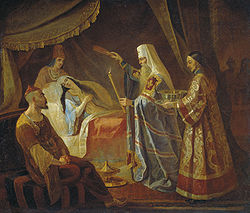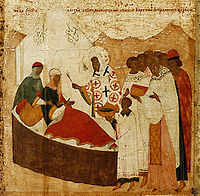Jani Beg
| Jani Beg | |
|---|---|
| Khan | |
 Jani Beg on the 1375 Catalan Atlas. | |
| Khan of the Golden Horde Western Half (Blue Horde) | |
| Reign | 1342–1357 |
| Predecessor | Tini Beg |
| Successor | Berdi Beg |
| Born | unknown date Golden Horde |
| Died | 1357 Sarai |
| Issue | Berdi Beg and others |
| House | Borjigin |
| Dynasty | Golden Horde |
| Father | Öz Beg Khan |
| Mother | Taydula Khatun |
| Religion | Islam |


Jani Beg, also known as Djanibek Khan, was a Khan of the Golden Horde from 1342 to 1357, succeeding his father Öz Beg Khan.
Reign[]
With the support of his mother Taydula Khatun, Jani Beg made himself khan after eliminating his older brother and rival Tini Beg at Saray-Jük in 1342; he had already killed another ambitious brother, Khiḍr Beg. He is known to have actively interfered in the affairs of Rus principalities and of Lithuania. The Grand Princes of Moscow, Simeon Gordiy and Ivan II, were under constant political and military pressure from Jani Beg.
Jani Beg commanded a massive Crimean Tatar force that attacked the Crimean port city of Kaffa in 1343. The siege was lifted by an Italian relief force in February. In 1345 Jani Beg again besieged Kaffa; however, his assault was again unsuccessful due to an outbreak of the Black Plague among his troops. Jani Beg's army catapulted infected corpses into Kaffa in an attempt to use the Black Death to weaken the defenders. Infected Genoese sailors subsequently sailed from Kaffa to Genoa, Messina, and Constantinople, introducing the Black Death into Europe.[1]
In 1356 Jani Beg conducted a military campaign in Azerbaijan and conquered the city of Tabriz, installing his own governor. He also asserted Jochid dominance over the Chagatai Khanate, attempting to unite the three khanates of the Mongol Empire. After accepting surrender from Shaikh Uvais, Jani Beg boasted that three uluses (districts/nations) of the Mongol Empire were under his control. Soon after this, he faced an uprising in Tabriz resulting in the rise to power of the Jalayirid Dynasty, an offshoot of Ilkhanate, and ultimately in the death of the Khan.
Muscovy's Chudov Monastery, founded at about the time of Jani Beg's fall by Metropolitan Aleksii and Sergei of Radonezh, was built on land that according to legend was granted to Aleksii by the Khan as thanks for the miraculous curing of his mother, Taydula, by the former.
The reign of Jani Beg was marked by the first signs of the feudal strife which would eventually contribute to the demise of the Golden Horde. Jani Beg's assassination in 1357 opened a quarter-century of political turmoil within the Golden Horde. Twenty-five khans succeeded each other between 1357 and 1378.
Family[]
Jani Beg had a number of sons, only one of whom, Berdi Beg, reigned after him, but proceeded to eliminate his brothers. Two or three more khans appear to have claimed to be Jani Beg's sons, and are sometimes treated as such by modern scholars.[2]
- Berdi Beg (r. 1357–1359)
- (pretended?) Qulpa (r. 1359–1360)
- (pretended?) Nawruz Beg (r. 1360)
- (pretended?) Kildi Beg (r. 1361-1362)
- a daughter, Shakar Beg, married Aq Sufi Qongirat, the prince of the Sufi dynasty of Khwarezm. Their daughter Khanzada Begum later married into the Timurid dynasty.[3]

Genealogy[]
- Genghis Khan
- Jochi
- Batu Khan
- Toqoqan
- Mengu-Timur
- Toghrilcha
- Uzbeg Khan
- Jani Beg
- Uzbeg Khan
- Toghrilcha
- Mengu-Timur
- Toqoqan
- Batu Khan
- Jochi
Popular culture[]
The 2012 Russian film The Horde is set during the reign of Jani Beg and is a highly fictionalised narrative of how Aleksii healed Taidula from blindness.
See also[]
References[]
- ^ "How the Plague Spread to Italy". Brown University. March 12, 2010.
But then, in 1347, to the Italians' delight, their opponents began to die off at an alarming rate - Janibeg's army was overcome by the Plague. Janibeg had no choice but to call off his siege, but not until he performed one last act of warfare against Genoa. Using the catapults designed to throw boulders and fireballs over the walls of fortified cities like Kaffa, Janibeg launched the Plague infested corpses of his dead men into the city. The Italians quickly dumped these bodies back into the sea, but the damage was done. Due to the squalid conditions forced upon Kaffa by the siege, it was ripe for the quick desolation of the Plague.
- ^ E.g., Buell 2003: 76; contrast Gaev 2002: 18-19, and Počekaev 2010: 122, 124.
- ^ Martin Bernard Dickson, Michel M. Mazzaoui, Vera Basch Moreen, Intellectual studies on Islam: essays written in honor of Martin B. Dickson (1990), p. 113.
Bibliography[]
- Buell, P. D., Historical Dictionary of the Mongol World Empire Oxford, 2003.
- Gaev, A. G., "Genealogija i hronologija Džučidov," Numizmatičeskij sbornik 3 (2002) 9-55.
- Horrox, R., The Black Death
- Kołodziejczyk, Dariusz (2011). The Crimean Khanate and Poland-Lithuania: International Diplomacy on the European Periphery (15th-18th Century). A Study of Peace Treaties Followed by Annotated Documents. Leiden: Brill. ISBN 9789004191907.
- David Morgan, The Mongols
- Počekaev, R. J., Cari ordynskie: Biografii hanov i pravitelej Zolotoj Ordy. Saint Petersburg, 2010.
- 1357 deaths
- Khans of the Golden Horde
- Murdered royalty
- 14th-century monarchs in Europe
- Mongol Empire Muslims